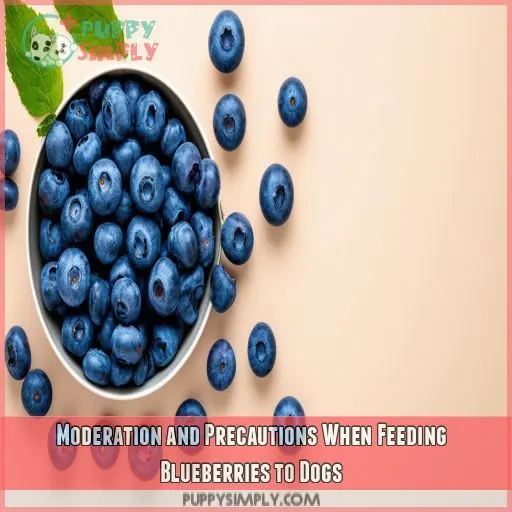This site is supported by our readers. We may earn a commission, at no cost to you, if you purchase through links.
 Did you know that 44% of dog owners sometimes share human foods with their pets? If you’ve ever wondered, "Can dogs eat blueberry muffins?" you’re not alone.
Did you know that 44% of dog owners sometimes share human foods with their pets? If you’ve ever wondered, "Can dogs eat blueberry muffins?" you’re not alone.
While blueberries themselves offer health benefits for canines, muffins contain ingredients that may be harmful.
This guide will reveal the tasty truth about blueberry muffins for dogs, explore safe alternatives, and provide you with expert insights to make informed decisions about your furry friend’s diet.
Let’s delve into the delicious details!
Table Of Contents
- Key Takeaways
- Can Dogs Eat Blueberry Muffins?
- Are Blueberries Safe for Dogs?
- Dog-Friendly Blueberry Treats
- Blueberries Vs. Blueberry Muffins for Dogs
- Moderation and Precautions When Feeding Blueberries to Dogs
- Handling Dog’s Digestive Issues After Eating Blueberries or Muffins
- Frequently Asked Questions (FAQs)
- What if my dog ate a blueberry muffin?
- Are blueberries safe for dogs to eat?
- Can dogs eat plain muffin?
- Can my dog eat blueberry cake?
- Can dogs with diabetes eat blueberry muffins?
- How many blueberries equal one blueberry muffin?
- Are store-bought blueberry muffins safer than homemade?
- Can puppies eat blueberry muffins safely?
- Do blueberry muffins provide any nutritional benefits for dogs?
- Conclusion
Key Takeaways
- Blueberry muffins are a tempting treat, but they aren’t the best option for our furry friends.
- Blueberries are safe for dogs in moderation and are packed with antioxidants and vitamins.
- It’s best to offer homemade blueberry dog treats or commercially available treats made with safe ingredients.
- Remember, moderation is key when it comes to treats, and always consult your veterinarian before introducing new foods.
Can Dogs Eat Blueberry Muffins?
You might be tempted to share your blueberry muffin with your furry friend, but it’s not the wisest move. While blueberries themselves aren’t toxic to dogs, muffins contain ingredients that can be harmful. The high sugar content in muffins isn’t ideal for dogs, especially those with health conditions like kidney disease.
For older dogs or those with specific dietary needs, monitoring phosphorus intake is essential. Muffin ingredients like butter, sugar, and flour offer little nutritional value and can lead to weight gain or digestive issues. It’s particularly risky for dogs with existing health problems.
Instead of sharing your muffin, consider offering plain blueberries as a treat. They’re packed with antioxidants and can be a healthy snack when given in moderation.
Are Blueberries Safe for Dogs?
Blueberries are generally safe for dogs and can offer health benefits like antioxidants and vitamins. However, you should be aware of potential risks such as choking hazards or digestive issues if fed in large quantities.
Health Benefits of Blueberries for Dogs
You’ll be pleased to know that blueberries offer several health benefits for your furry friend. These tiny powerhouses are packed with nutrients that support your dog’s overall well-being. Here’s how blueberries can boost your pup’s health:
- Antioxidants fight harmful free radicals
- Vitamin C strengthens the immune system
- Phytonutrients improve cognitive function
- fiber aids in digestion and weight management
- Low-calorie carbs provide energy without excess calories
Risks of Feeding Blueberries to Dogs
While blueberries offer health benefits, you should be aware of potential risks. Excessive consumption can lead to gastrointestinal distress due to high sugar content.
For dogs with chronic kidney disease, the high phosphorus levels in blueberries may be concerning. It’s essential to monitor your pup’s intake and consider their overall diet.
Dog-Friendly Blueberry Treats
While blueberry muffins aren’t ideal for dogs, you can make safe blueberry treats at home or buy specially formulated ones. Try making simple homemade dog biscuits with fresh blueberries, or look for reputable brands that offer blueberry-flavored dog treats with appropriate ingredients.
Homemade Blueberry Dog Treat Recipe
Now that you know blueberries are safe for dogs, why not whip up some homemade treats? Here’s a simple recipe for blueberry dog muffins.
Mix whole wheat flour, oats, mashed banana, and blueberries. Add an egg and a dash of honey. Bake in mini muffin tins for 15 minutes at 350°F.
These vitamin K-rich treats are perfect for training and spoiling your pup with fruit-filled goodness.
Store-Bought Blueberry Treats for Dogs
Looking for convenient blueberry treats for your pup? Many commercial options are available, but be cautious.
Check the sugar content and caloric intake to prevent obesity. Some treats support cognitive function and brain health, while others focus on dental health.
Always read labels carefully, as some dogs may have food sensitivities. Remember, moderation is key.
Opt for treats with natural ingredients and minimal additives to keep your furry friend happy and healthy.
Blueberries Vs. Blueberry Muffins for Dogs
While blueberries are a safe and nutritious treat for dogs, blueberry muffins aren’t the best choice. Muffins often contain added sugars, fats, and potentially harmful ingredients like chocolate chips or xylitol. Instead, opt for fresh or frozen blueberries as a healthier alternative.
If you’re keen on treating your furry friend to something special, consider whipping up homemade dog-friendly blueberry treats. These allow you to control the ingredients and cater to any dietary concerns, such as managing phosphorus intake for dogs with kidney issues. You can find plenty of safe, tasty recipes online that’ll have your pup’s tail wagging.
Moderation and Precautions When Feeding Blueberries to Dogs
While blueberries can be a healthy indulgence for your furry companion, it’s essential to exercise restraint and take precautions. Keep these key points in mind:
- Control portions: Limit blueberries to 10% of your dog’s daily calorie intake.
- Monitor sugar levels: Excessive berries can elevate blood sugar, particularly in diabetic dogs.
- Introduce gradually: Begin with a few berries to assess for allergies or sensitivities.
Always consult your veterinarian before introducing new foods to your dog’s diet, especially if they’ve health concerns. Consider alternative treats like carrot sticks or apple slices for variety. When offering blueberries, wash them thoroughly and discard any stems. Frozen blueberries can be a delightful summer treat, but moderation is key. Remember, each dog is unique, so what works for one may not be suitable for another. Observe your pup’s reaction closely to guarantee their treat-time remains safe and enjoyable.
Handling Dog’s Digestive Issues After Eating Blueberries or Muffins
If your dog experiences digestive upset after eating blueberries or muffins, don’t panic. Monitor their behavior closely for signs of discomfort, such as vomiting or diarrhea. Prevention strategies include limiting access to human foods and offering dog-safe alternatives.
To ease mild symptoms, try dietary adjustments like a bland diet of boiled chicken and rice. Keep your furry friend hydrated and consider adding a probiotic to their meals.
Frequently Asked Questions (FAQs)
What if my dog ate a blueberry muffin?
If your dog ate a blueberry muffin, don’t panic. It’s not toxic, but watch for upset stomach. Limit treats to avoid weight gain. If symptoms persist or worsen, contact your vet for advice on next steps.
Are blueberries safe for dogs to eat?
Yes, blueberries are safe for dogs to eat. They’re packed with antioxidants and make a healthy snack. You can offer them fresh, frozen, or mashed. Just remember to keep portions small, as with any treat.
Can dogs eat plain muffin?
You can offer your dog a small piece of plain muffin occasionally. However, it’s not nutritionally beneficial and contains unnecessary calories. Stick to dog-specific treats and a balanced diet for your furry friend’s best health.
Can my dog eat blueberry cake?
You shouldn’t feed your dog blueberry cake. While blueberries are safe, the cake’s sugar and fat content can upset their stomach. Stick to dog-friendly treats or plain blueberries as an occasional snack for your furry friend.
Can dogs with diabetes eat blueberry muffins?
No, dogs with diabetes shouldn’t eat blueberry muffins. The high sugar content can cause lasting health issues for diabetic dogs.
How many blueberries equal one blueberry muffin?
A typical blueberry muffin recipe calls for 6-8 ounces of blueberries, which is about 1 cup. So, 1 cup of blueberries equals one blueberry muffin.
Are store-bought blueberry muffins safer than homemade?
Store-bought blueberry muffins may be safer than homemade ones as they’re less likely to contain ingredients that could be harmful to dogs. However, even store-bought muffins should be fed to dogs in moderation due to their sugar content.
Can puppies eat blueberry muffins safely?
You might be tempted to share your tasty treats with your furry friend, but beware! Puppies have delicate tummies that may struggle with rich ingredients, leading to digestive woes. While blueberries are generally safe for dogs, muffins often contain extra sugars and fats, as well as potential toxins like chocolate, xylitol, or nutmeg.
Do blueberry muffins provide any nutritional benefits for dogs?
Blueberries have nutritional benefits for dogs, such as fiber, vitamins, and antioxidants. However, they should be fed in moderation, as too many can cause digestive issues and some dogs are allergic.
Conclusion
So, can dogs eat blueberry muffins?
The answer is a cautious no.
While blueberries offer health benefits for dogs, the additional ingredients in muffins may be harmful.
It’s important to be mindful of the potential risks and opt for dog-friendly blueberry treats instead.
Always exercise moderation when introducing new foods to your dog’s diet, and consult your veterinarian if you have any concerns.











